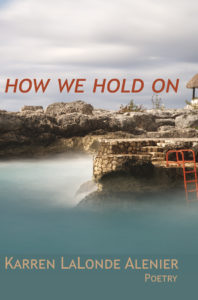 Review by Sara Epstein
Review by Sara Epstein
Karren LaLonde Alenier, author of How We Hold On, has written seven previous collections of poetry, including The Anima of Paul Bowles, chosen by the Grolier Bookstore of Boston, MA as a 2016 staff pick. Her collection Looking for Divine Transportation won the 2002 Towson University Prize for Literature. Alenier also collaborated with composer William Banfield and Encompass New Opera Theatre artistic director Nancy Rhodes to write the jazz opera Gertrude Stein Invents a Jump Early On, which premiered at New York City’s Leonard Nimoy Thalia in June 2005.
The book is divided into four sections. The first, “MAMA’S NOT A TRAPEZOID” is the section most directly about her relationship with her mother and mothering, while the second, “GIRL TALK,” includes the powerful list poem “NO ENTRANCE,” which describes what is not allowed on a visit to someone in prison (29). The third section, “WHEN IT DROPS YOU GONNA FEEL IT,” evokes her loves, and impressions of Jamaica, then the collection closes with “THOSE DEAR ONES,” which includes themes related to 2020 and the COVID19 pandemic.
The title poem, “How We Hold On” is made up of 8 lines which are each 8 syllables long. We hear how others in the speaker’s family hold onto objects, and how she comes to terms with what she herself holds. The structure itself is a kind of holding in the way it contains her message in this rhythmic, evenly spaced form (23). In a May 2021 interview at Stockbridge Library, Alenier explained her use of form: “I pick a form when the subject is hard to handle and can benefit from some limitations” (alenier.blogspot.com).
Similar themes and uses of structure appear in other poems, as in “All American Girl.” In this villanelle, the speaker’s cousin has asked not to be cremated or buried; we share with the relatives the struggle to understand and to honor her wishes (36). “What Was Hidden” is yet another masterful example, using form to show what hides in plain sight. A line from Claude McKay’s poem “My House”—“I know the dark delight of being strange the penalty of difference in the crowd the loneliness of wisdom among fools”—is broken down so that his words end each line of Alenier’s. Alenier evokes Anne Frank as she looks back on race and white privilege in a scene from childhood. In a seemingly simple narrative, she invites us to examine hidden contradictions, the absurdity of racial lines, and practices and biases that still exist (33).
The title poem of the third section, “WHEN IT DROPS YOU GONNA FEEL IT,” refers to Toots Hibbert’s song Pressure Drop. The poem’s images and rhythms transport us to Hibbert’s home country, Jamaica:
we traded
Internet for mosquito
net cocooned
for sleep
under a halo
of white mesh (46)
In this third set of poems, reggae music, the cliffs of Negril, and seaside sunsets serve both to celebrate love and to chronicle paradoxes of pain and suffering. I was delighted to find a poem titled “The Relevance Of Mint.” It is summertime as I read; mint seems completely relevant, so I am attending closely. What I hear is an ode to mint, its relevance to her memories and her relationships with her son and with her lover, who grows it for her: “these fragrant leaves that sing he loves me” (51).
The final section includes a series of epistolary poems to her deceased great grandfather. For example, “30 March 2020” reflects on family members who died in the Spanish flu pandemic of 1918, while also speaking of 2020 losses due to COVID19 (81). Another poem in this section, “What Was Given,” explores what goes unsaid when her son gives her a gift (80).
Alenier pulls us along with minimal or no punctuation. We pause in the white spaces, line breaks, and other places where it makes sense to pause. Otherwise, we race with the pace of the speaker’s life. Alenier engages the reader in both what is said and beautifully formed and in what is hidden, missing, or left unsaid. As she says in her poem “God And The Garden,” there is “always something in the garden / out of reach today…” (63).
How We Hold On by Karren LaLonde Alenier
Broadstone Books, 2021, $16.95
ISBN: 9781937968809
Sara Epstein is a clinical psychologist from Winchester, Massachusetts, who writes poetry and songs, especially about light and dark places. Her poems have recently appeared in Mocking Heart Review, Poetry Quarterly, Amethyst Review, Constellate Magazine, Buddhist Poetry Review, Mom Egg Review, Chest Journal, Literary Mama, Poems in the Afterglow, and two anthologies: Sacred Waters and Coming of Age.
